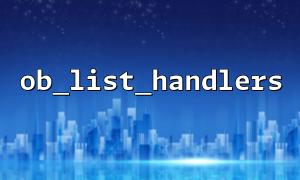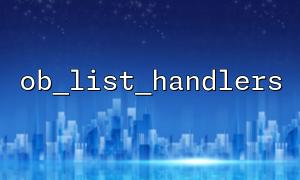During PHP development, the caching mechanism can effectively improve program performance, but sometimes we need to debug the cache and view the cache behavior in order to discover potential problems. PHP provides multiple functions to help us manage and debug output buffers. Among them, ob_list_handlers is a very useful function that lists the currently active output buffer handler and helps us understand cache operations in the program.
ob_list_handlers is a PHP built-in function that returns an array containing all output buffer handler names currently registered. Each handler corresponds to an output buffer, and PHP allows the output to be manipulated by registering the handler when processing response output.
By debugging these handlers, we can determine how the cache operates, whether there is a problem that the cached data is not output correctly, or whether there is unnecessary cache processing that affects the performance of the page.
First, we need to enable the output buffer. Usually, the output buffer is started with the ob_start() function, after which you can use ob_end_flush() or ob_flush() to process the buffer content.
Next, use ob_list_handlers to view the currently active buffer handler.
<?php
// Start the output buffer
ob_start();
// Output some content
echo "This is a test of the output buffer.";
// use ob_list_handlers Get the current output buffer handler
$handlers = ob_list_handlers();
// Output the current buffer handler
echo "<pre>";
print_r($handlers);
echo "</pre>";
// End and output buffer content
ob_end_flush();
?>
Enable output buffer:
ob_start() starts the output buffer. At this time, all output will not be sent directly to the browser, but will be temporarily stored in the buffer.
Output content:
echo prints a piece of text to the buffer.
Get and print the output buffer handler:
ob_list_handlers() returns an array containing all output buffer handlers currently registered. You can print it to view all active buffer handlers.
End and output the buffer:
ob_end_flush() ends the current buffer and sends its contents to the browser.
Suppose we are debugging a complex PHP application, and the output buffer processing may contain different content. For example, there might be a compressed output handler, or a cached data handler. By calling ob_list_handlers() we can see which handlers are currently registered and further check if they work as expected.
Array
(
[0] => ob_gzhandler
)
Assuming your page loads slowly or the cache doesn't work as expected, you can check for extra output buffer handlers via ob_list_handlers . For example, some compression handlers may compress content when unnecessary, affecting the loading of the page.
If we see that there are multiple handlers, such as ob_gzhandler (for compressing content), and this handler is not suitable for enabling in some cases, we can try disabling it or debugging its behavior to see if performance is improved.
View handler:
Use ob_list_handlers() to view the current handler. If you find multiple compression handlers, it may be that some plug-ins or middleware have compression enabled when not needed.
Remove unnecessary handlers:
Use ob_end_clean() or ob_flush() to manually clear the buffer contents and remove unnecessary handlers.
Optimize output buffer:
Based on the debugging results, optimize the output buffer strategy in the program. For example, disable unnecessary compression handlers, or output the contents of the buffer directly.
ob_list_handlers is a very useful tool for debugging PHP cache issues. It helps developers view the currently active buffer handler to analyze and resolve cache-related issues. By using the output buffer correctly, developers can improve page loading speed and avoid the performance impact of unnecessary cache processing.
<div style="height: 20px;"></div>














